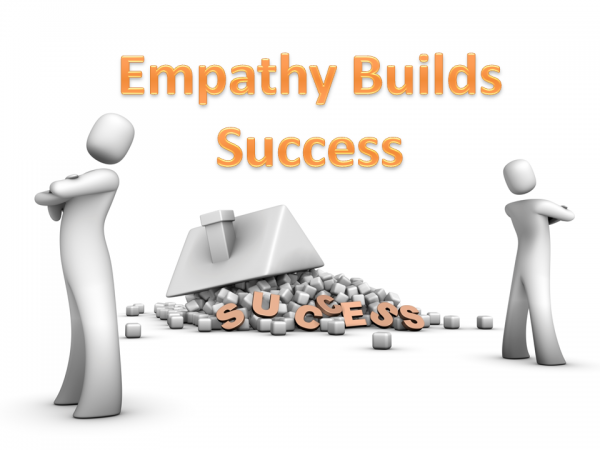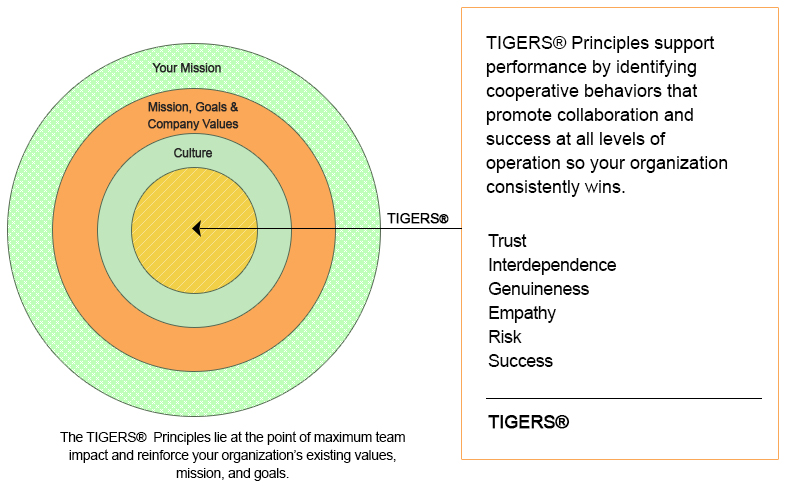
Why is that?
Technology is growing and changing at a rapid pace. More and more daily life experiences are met with machine interactions, rather than human beings. Because of this, the ability to understand and imagine others’ feelings and circumstances stands out as one of the most important leadership skills that leaders must master to.engage and retain talented employees in a technically complex world.
Empathy is a TIGERS(R) core principle required for a collaborative workplace.
Empathy, which is the “E” in TIGERS, is a universal collaborative team culture principle (the other five principles are trust, interdependence, genuineness, risk and success). Empathy is a person’s desire and ability to understand another person’s perspective or circumstance, regardless of whether or not he agrees with that person. Empathy is the ability to imagine what another person feels, desires or needs. As a leadership quality, it is extremely valuable because it allows leaders to connect on an individual and emotional level with employees.
Through an empathetic approach, leaders are able to better understand why their team members do what they do. This results in team members feeling understood and more loyal to their leaders, team members and organizations.
Empathy is the foundation of a team culture that values kindness, generosity, compassion, helpfulness and a relaxed and secure state of mind. These organizational outcomes in turn lead to higher employee engagement and increased job satisfaction. These conditions also stimulate a higher order of thinking that promotes a work environment which is creative, inspired, happy, collaborative and ultimately productive.
Team members value the opportunity to work for something bigger than themselves while achieving goals and receiving empathy in return. Since empathy is such an important quality for leaders to possess, what can they do to restore empathy in a struggling workplace?
Give your team members attention on an individual basis to build empathy.
One of the best places to start when repairing empathy in your workplace is through individual attention given to employees. As a leader, you need to get to know your team members on an individual basis, which typically begins with transparency and openness on your part.
Open up yourself to your team members on an emotional level by listening to them and imagining what it would be like for you if the situation was flipped. Then you can share your own heartfelt thoughts and experiences that are ultimately helpful for the employee. This modeling will also prepare your team members to do the same with you and with co-workers.
Get to know your team members individually and on a personal basis and not just through work. Ask your team members about their personal lives, and even consider spending time with them socially through group activities like bowling leagues or wellness walking groups. While this approach may not be feasible for everyone, it does helps leaders understand their team members’ motivations, goals and struggles. As a result, leaders are better equipped to deal with workplace problems, system’s issues and work frustrations so they can remove the hurdles employees face. Ultimately this results in leaders getting more work done to grow the company. It also reduces the time spent with workplace drama. This is because empathy is not rolling around in the muck with employees. It is understanding how that muck came about and helping an employee discover their own solutions to avoid the muck in the future.
Some actions that leaders can implement to promote empathy in the workplace include:
- Commitment to improving the emotional safety of all employees.
- Commitment to improving the physical safety of all employees.
- Commit to building opportunity for fulfillment for employees.
- Be Kind toward self and others.
- Foster happiness and satisfaction toward self and others.
- Be curious and desire to understand others.
- Build and demonstrate good listening skills.
- Build and demonstrate good inquiry skills.
- Identify your own personal boundaries to avoid being sucked into drama.
- Build positive self-esteem in yourself and others.
- Coach and mentor employees to help them achieve personal and work goals.
- Develop a good awareness and understanding of one’s own personal feelings and emotions.
As the “E” in TIGERS, empathy is one of the most important leadership skills that every leader should have in their toolkit. While not a new workplace concept, empathy has emerged in the forefront as one of the top 10 leadership topics for 2018. With good reason.
As a leadership skill, empathy pushes leaders to listen with the intent of understanding where their employees are coming from. The benefit promotes a collaborative and trusting workplace culture that nurtures employee creativity, productivity and profitability. If empathy is lacking in your workplace culture, focus on honing your listening skills and forge better relationships with your team members. Then promote activities that build a collaborative workplace environment.
Care to dig deeper into this conversation?
Consider these articles to add to the conversation:
- 10 Hot Leadership Topics for 2018
- 9 Practical Steps to Restore Empathy in the Workplace
- Crampton, Dianne. TIGERS Among Us: Winning Business Team Cultures And Why They Thrive. Three Creeks Publishing (2010).
- Leadership Empathy Webinar
- Empathy Podcast
Copyright TIGERS Success Series, inc. by Dianne Crampton
About TIGERS Success Series, Inc.

We specialize in training your managers in group facilitation methods that build workforce cooperation and high performance team dynamics. Scaled to grow as your organization and leadership performance grows, our proprietary Team Behavior Profile and Management training workshops are based on the six principles we have found to be the right mix to make this happen.
The TIGERS 6 Principles are Trust, Interdependence, Genuineness, Empathy, Risk and Success. Born from our many years of business, psychology, and educational group dynamic research, and subsequent four years of independent evaluation, we instill and sustain behaviors that improve work group performance and talent retention for measurable ROI.
TIGERS serves committed leaders who desire enhanced cooperation among departments, teams, managers and individual employees. This heightened level of cooperation leads to improved revenue, purpose, commitment and impact. Employees quit companies because they don’t get along with leaders and co-workers. Work culture refinement and behaviors that build strong relationships erase this trend in fully measurable ways.
For more information or to request a presentation to your group or association, call 1+541-385-7465 or visit https://corevalues.com